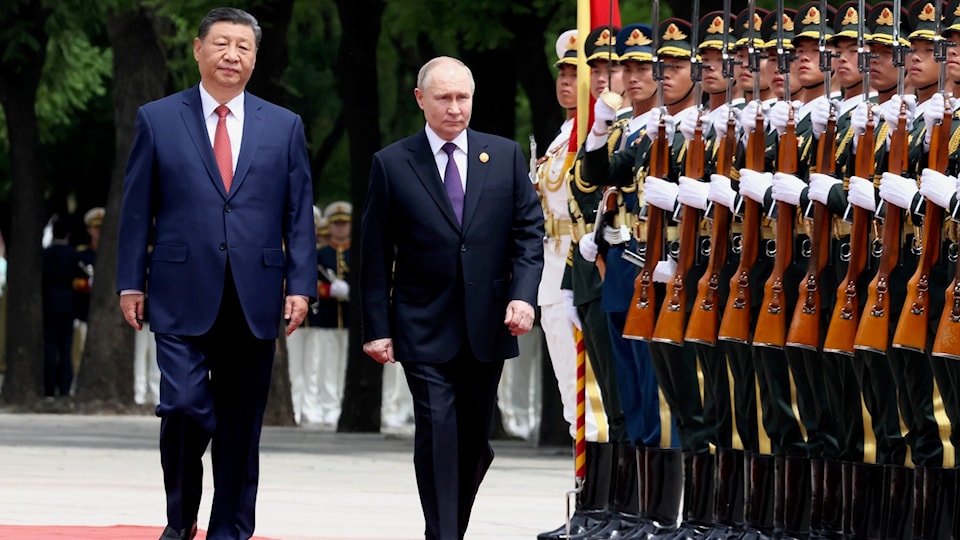Russian President Vladimir Putin travelled to Bejing to meet with Chinese President Xi Jinping where the two discussed bilateral ties and the war in Ukraine.
The leaders signed "joint statements on enhancing the comprehensive partnership and strategic cooperation between the People’s Republic of China and the Russian Federation for a new era in the context of the 75th anniversary of establishing diplomatic relations," Xi said in a media release.
Xi hailed the economic relationship between Beijing and Moscow, with trade last year valued in excess of US$240 billion and said he would support further economic ties.
"We must support networks promoting fundamental research, unleash our cooperation potential in high-technology sectors, step up our cooperation on border crossings, transport and logistics, and ensure the stable operation of global manufacturing and supply chains," Xi said in a joint statement.
Xi said he was prepared to continue developing the countries' "no limits" partnership.
This strengthening of economic ties between the two countries comes as Russia has replaced long-time Minister of Defence Sergei Shoigu with Andrei Belousov, considered to be a member of the country's economic elite.
Putin's two-day visit, at the invitation of Xi, comes less than a week after Russia launched a renewed offensive into the Kharkiv region in northeastern Ukraine.
Political Science Professor Lubomyr Luciuk with the Royal Military College of Canada said the relationship between the two countries positions Russia as subordinate to China.
"They do indeed have a relationship, but again, it's not a partnership among equals, it's not a marriage, it's more of an exploitative relationship by the dominant partner, which the weaker partner has really little choice but to accept because, without China's support, it's questionable whether the Russian Federation could sustain its war against Ukraine," Luciuk said.
"China is a significant culture, a society that, civilization, if you like, that goes back, depending on how you count it, several thousand years. To them, they're dealing with an inferior civilization and one that's come asking them for handouts, for support," he said.
Xi is acutely aware of the historical relationship between the two countries, when Tsarist Russia and the Soviet Union could dictate to and dominate China, and the tables have turned now, Luciuk said.
The Washington, D.C.-based Institute for the Study of War (ISW) assesses that Belousov's appointment to the Ministry of Defence is a significant development in Putin's efforts to set full economic conditions for a protracted war.
"These high-level reshuffles following the Russian presidential election strongly suggest that Putin is taking significant steps towards mobilizing the Russian economy and defence industrial base (DIB) to support a protracted war in Ukraine and possibly prepare for a future confrontation with NATO," according to the ISW's May 12 update.
Xi, in a media release, said trade, economic, investment, energy, cultural and humanitarian cooperation are all growing stronger between the two countries.
China has already provided billions of dollars in machine tooling to Russia, the Jamestown Foundation, a Washington D.C.-based think tank, said in a report earlier this year.
These machine tools are used by Russia's defence industry to manufacture weapons used in the Ukraine war.
The Carnegie Endowment, another Washington D.C.-based think tank, said Chinese exports have played a key role in sustaining Moscow’s war effort.
"Russia’s reliance on China for high-priority products surged from 32 per cent in 2021 to 89 per cent in 2023," said a May 6 report.
It is Putin's first state visit after his inauguration for a fifth term as Russian president on May 7.
The two leaders met and had a conversation at the Great Hall of the People in Beijing, a ceremonial venue, according to the Russian president's office.
Before he arrived in China, Putin had a written interview with Chinese state media Xinhua, in which he expounded on the bilateral relationship.
"Today, Russia-China relations have reached the highest level ever, and despite the difficult global situation continue to get stronger," he said.
In the same interview, Putin railed against the U.S.-led world order and commended Xi's peace plan for Ukraine.
He accused Western elites of refusing to respect "civilizational and cultural diversity," rejecting traditional values and seeking to retain their global dominance.
"They disregard other countries' sovereign interests. They seek to ensure their well-being at the expense of other states, just like in the old days, and resort to neo-colonial methods to that end," Putin said in the interview.
Concerning China's 12-point peace plan titled "China's Position on the Political Settlement of the Ukraine Crisis" published last year, Putin said he commended China's efforts and said they show the "genuine desire of our Chinese friends to help stabilize the situation," Putin said.



